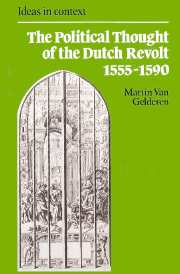Book contents
- Frontmatter
- Contents
- Preface
- List of abbreviations
- 1 Introduction
- 2 The Dutch Revolt: historical contexts
- 3 Religion and resistance: the case of Reformed Protestantism
- 4 Politics and resistance: the political justification of the Dutch Revolt
- 5 From revolt to republic: the quest for the best state of the commonwealth (1578–1590)
- 6 Politics and religion (1572–1590): the debates on religious toleration and the substance of liberty
- 7 Conclusions: the Dutch Revolt and the history of European political thought
- Appendix: a note on primary sources
- Bibliography
- Index
- IDEAS IN CONTEXT
7 - Conclusions: the Dutch Revolt and the history of European political thought
Published online by Cambridge University Press: 15 December 2009
- Frontmatter
- Contents
- Preface
- List of abbreviations
- 1 Introduction
- 2 The Dutch Revolt: historical contexts
- 3 Religion and resistance: the case of Reformed Protestantism
- 4 Politics and resistance: the political justification of the Dutch Revolt
- 5 From revolt to republic: the quest for the best state of the commonwealth (1578–1590)
- 6 Politics and religion (1572–1590): the debates on religious toleration and the substance of liberty
- 7 Conclusions: the Dutch Revolt and the history of European political thought
- Appendix: a note on primary sources
- Bibliography
- Index
- IDEAS IN CONTEXT
Summary
THE POLITICAL THOUGHT OF THE DUTCH REVOLT
The principal aim of this study has been to reconstruct the ideas on the issues of obedience and resistance and on the character of the best state of the commonwealth as developed during the Dutch Revolt. By way of conclusion this final chapter will relate the political thought of the Dutch Revolt to some of the main streams of sixteenth-century European political thought. By comparing the political thought of the Dutch Revolt with the political ideas of the Lutheran and Calvinist Reformation, with the monarchomach ideology of French Huguenots, and with the republican theories of the Italian Renaissance, an attempt will be made to arrive at some conclusions about its character and origins, and, last but certainly not least, to indicate its significance for the history of European political thought.
Formulating the essentials of this study, two conclusions should be emphasized. First, that during the Dutch Revolt a substantial body of Reformed Protestant treatises was published which, employing a highly biblical vocabulary, presented a more or less unified conception of the origins and duties of political authority, elaborated a multivalent plea for freedom of conscience, entailed a right of disobedience for individual subjects and, finally, sought to indicate the lines of demarcation between ecclesiastical and political authority.
Unanimously, Reformed Protestant authors, mostly ministers, assumed that political authority was ordained by God to temper the wickedness of man, punishing the wrongdoer and protecting the good.
- Type
- Chapter
- Information
- The Political Thought of the Dutch Revolt 1555–1590 , pp. 260 - 287Publisher: Cambridge University PressPrint publication year: 1992

